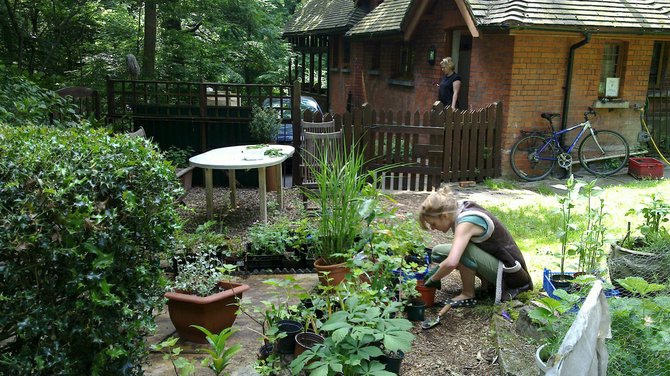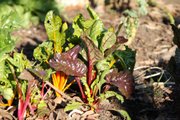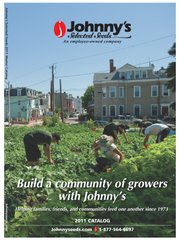Now is the time to plan the placement and diversity of your summer crops. Photo by Courtesy Johnny’s Selected Seeds
Organic gardeners may be eager to get out and garden, but it's still too early to plant summer crops. We can start planning, though, savoring the bounteous crop of garden seed catalogs arriving daily in the mail. Planning should include deciding on the plants we want to put out (and where), and preparing the soil to plant.
Plowing or tilling a time or two before planting time can make the soil good and crumbly, if done when the soil is suitably dry. Wet soil creates clumps that lock up nutrients. Well-tilled soil makes it easier for roots to access food and water.
Make sure you have plenty of vegetative matter worked into the soil to provide "tilth," a mix of soil and matter that holds nutrients and water even in prolonged dry spells. This matter is especially good for the earth if it's recycled: Try plowing under your cover crops for "green manure," or using last year's lawn clippings or last fall's crumbled-up leaves, mixed with kitchen compost that you have been saving.
Too many people just buy inputs--such as bags of sphagnum peat moss--and dump it in their gardens. Although peat is widely sold, if consumers knew how critical and rare the material was, they wouldn't treat it so cavalierly.
Some scientists say that the world's peat bogs are as vital and endangered as the rainforests. Not only do they hold moisture in their indigenous habitats as a protection against local droughts, they provide habitat for wildlife, and they also hold prodigious amounts of carbon--which protects the planet from climate change. Using peat moss in the garden releases that stored carbon into the atmosphere as carbon dioxide. Many people who routinely used peat are now turning to renewable organic matter, such as cocoa shells.
While you are planning your garden, make sure you have fertile soil by taking a sample down to the extension service to be tested. That will tell you precisely what you need to add to your soil to grow good crops and what elements are in abundance so that you don't over fertilize. We want healthy soil in organic gardening, without artificial inputs or runoff that will harm the environment.
One issue that came up during the Mississippi Fruit and Vegetable Growers Association workshops last November was the experience of some organic farmers in north Mississippi who were baffled by their plants failing to grow.
They discovered, to their horror, that the hay they had bought for mulching had herbicide residue that was killing their plants. The moral: Be careful about your inputs.
Jim PathFinder Ewing is a journalist, author, writer, editor, organic farmer and blogger. His latest book, "Conscious Food: Sustainable Growing, Spiritual Eating" (Findhorn Press), is in bookstores now. Find Jim on Facebook or follow him @edibleprayers or @organicwriter or visit blueskywaters.com.
PEAT MOSS
For more on the use of peat moss, see this post on Natural Life Magazine's website, "Does Peat Moss Have a Place in the Ecological Garden?" by Wendy Priesnitz: jfp.ms/peatmoss
COMPOST ADVICE
The Rodale Institute provides great tips on composting, including answers to common questions about antibiotics and heavy metals. Visit jfp.ms/compostingtips.
Or, you can look back in my previous articles and blogs by searching: ShooFlyFarmBlog.
ANALYZE YOUR SOIL
The Mississippi State University Extension Service Soil Testing Laboratory analyzes soil. It only costs $6 for a routine analysis. For more information, see msucares.com/crops/soils/testing.html, or visit your local extension office or write: Soil Testing Laboratory, Box 9610, Mississippi State; or call 662-325-3313.
SEED COMPANIES TO TRY
The most luxurious full-color catalog is by Baker Creek Heirloom Seeds. Some people call it "garden porn" because of the lavish pin-up-like pictures of fruits and vegetables. To order a catalog, visit rareseeds.com or call 417-924-8917.
Johnny's Selected Seeds is an organic mainstay. Johnny's is where Eliot Coleman, the quintessential "deep" organic intensive gardener at Four Seasons Farm in Maine, sells tools he has designed. Johnny's announced in this year's catalog that the company is now 100-percent employee owned. We buy our lettuce mixes from them. To order a catalog, visit johnnyseeds.com or call 1-800-854-2580.
High Mowing Organic Seeds is relatively new, but seems committed to organics. To order a catalog, visit highmowingseeds.com or call 1-802-472-6174.
MORE FAVORITES:
Peaceful Valley Farm Supply, 1-888-784-1722; Grass Valley, Calif.
Seeds of Change, 1-888-762-7333; Santa Fe, N.M.
Southern Exposure Seed Exchange, 540-894-9480; Mineral, Va.
Seed Savers Exchange, 563-382-5990; Decorah, Iowa
WATCH YOUR SEEDS
Remember to use certified organic seeds. As noted in a previous column, the practice is not merely to promote organic, but because the seeds are bred to grow differently. Standard "conventional" varieties, unless stated otherwise, are developed for industrial agriculture, producing uniform height, size, fruiting, etc. So, if you want a tastier tomato or corn, buy seed varieties bred for the home gardener.





Comments
Use the comment form below to begin a discussion about this content.
comments powered by Disqus